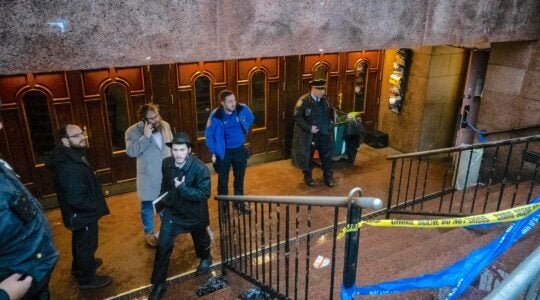Last Rosh HaShanah, for reasons eluding mortals, Aharon Ben-Avraham was not inscribed in the Book of Life. After the holidays, a cancer grew in his brain. By summer his body was in a private autumn: memory, speech, even the ability to swallow, withered and fell away like weightless leaves.As life recedes, the world recedes as well. In a city craving information about the arts, feuds and fashion, the news seemed surreal, echoes of a distant planet. Amid the trivial, he sought the eternal. Ben-Avraham held a cassette player containing a tape of Bnai Jeshurunís rabbis performing the Shabbat service.Friday at dusk, friends came to his apartment, bringing challah. Theyíd tear off the challah and feed him gently. The friends would welcome Shabbat, sing the old Friday night davening and kiss him goodbye, a soft kiss on his skull, a kiss on his hand.When the decree of last Rosh HaShanah came to pass, he was brought to a neighborhood funeral parlor for the tahara preparation.According to Jewish tradition, the moments between death and burial are particularly harrowing for the soul that is conscious of his or her disconnection from the now useless body. To comfort the soul on this last night outside a grave, friends come to be a shomer, a guardian, to sit alongside and soothe with a familiar presence and Psalms.Not knowing if thereíd be enough shomrim, the funeral home arranged for a fellow from Borough Park to come and just be there, just in case. This shomer was down on his luck, and this was a way to earn a few dollars and a mitzvah.Rabbi Felicia Sol, ordained by Hebrew Union College just over a year ago, and now a rabbinic fellow at Bnai Jeshurun, says, ìWe havenít been able to get our community to do shmira for the complete period of time [between death and burial] and so we end up having to hire outside shomrim who didnít have a relationship with the person.îThere was no shortage of friends, though, for Ben-Avraham. Yakov came to be a shomer after a preparatory and purifying trip to the mikveh. Being a shomer was a way, says Yakov, to continue a friendship into the Other World, as well.Rabbi Sol often sat with Ben-Avraham in life, but had only been a shomer ìonce or twice.î She sat with her friend once more. ìI think of myself as watching over the person and standing by them in that intermediate time between death and burial. I choose Psalms that I particularly like, the Shirei HaMaalot. [Ben-Avraham] was someone we sang to a lot. I chose several of the Psalms that were familiar in our singing, such as Esa Einei [ëI will lift my eyes to the mountains,í Psalm 121] and Yehi Shalom Bechaylaych [ëPeace be within your walls, serenity within your palace,í Psalm 122]. I definitely believe in sitting with the body, to stay with someone in death as in life.îThe shomrim came, walking as if in another dimension, through the Saturday night fiesta of Upper Manhattan, and then down into the nether regions of the funeral parlor. A caretaker took them down in the elevator, and through a carpeted room where caskets ó oak, mahogany, cherry, walnut ó were displayed.A door opens into a narrow hallway. The parlorís decor turns industrial. The lighting is harsh. The walls are cinder blocks painted tan. There is no carpeting. There is none of the solace-evoking atmospherics of the rest of the ìhome.î Ben-Avraham was within the confines of the walk-in refrigerator. A traditional, plain pine box, his ark of choice, was a few feet away, awaiting him.In the corner of the hallway was a seat for the shomer; a shabby, olive-colored cushioned chair with metal hand rests. An old Zenith clock radio, unplugged, was in a pile of sundries along with a Jewish newspaper, a volume of Tehillim, and a bencher from a bar mitzvah in a long-ago catering hall. A 24-hour memorial candle with a blue Jewish star on its glass enclosure sits on a dusty plate.On Ben-Avrahamís final night in the world, the Chevra Kaddisha prepare him for Heaven in a room with a sink, metal pails, a mikveh, and a drain in the floor; practicality and transcendence are joined.The chevra apologize to Ben-Avraham if in any way they might offend his dignity.A chevra member recites the ritual words, ìAnd I will pour upon you pure water and you will be purified….î They speak of Godís forgiveness and blessings for a soul that could no longer ask for it.While washing him, the chevra say, from the Song of Songs. ìHis cheeks are like beds of spices, yielding fragrance. His lips are roses dripping with flowing myrrh… His appearance is like the Lebanon, choice as the cedars. His mouth is most sweet and he is altogether precious. This is my beloved and this is my friend…îThe New Year is here and the truest sentence in this newspaper is that some of us wonít see another one. In the meantime, and for many years, we can be each otherís shomer, comforting and watching without waiting for that night.Thereíll be a funeral in several hours. As one shomer leaves the parlor the caretaker gives him a cup of water to ritually wash his hands. Water splashes to the sidewalk. The wind is cool on wet skin. It is pre-dawn. The shadows, fire escapes, drifters and pigeons are spectacular through the eyes of a dead man.
The New York Jewish Week brings you the stories behind the headlines, keeping you connected to Jewish life in New York. Help sustain the reporting you trust by donating today.




